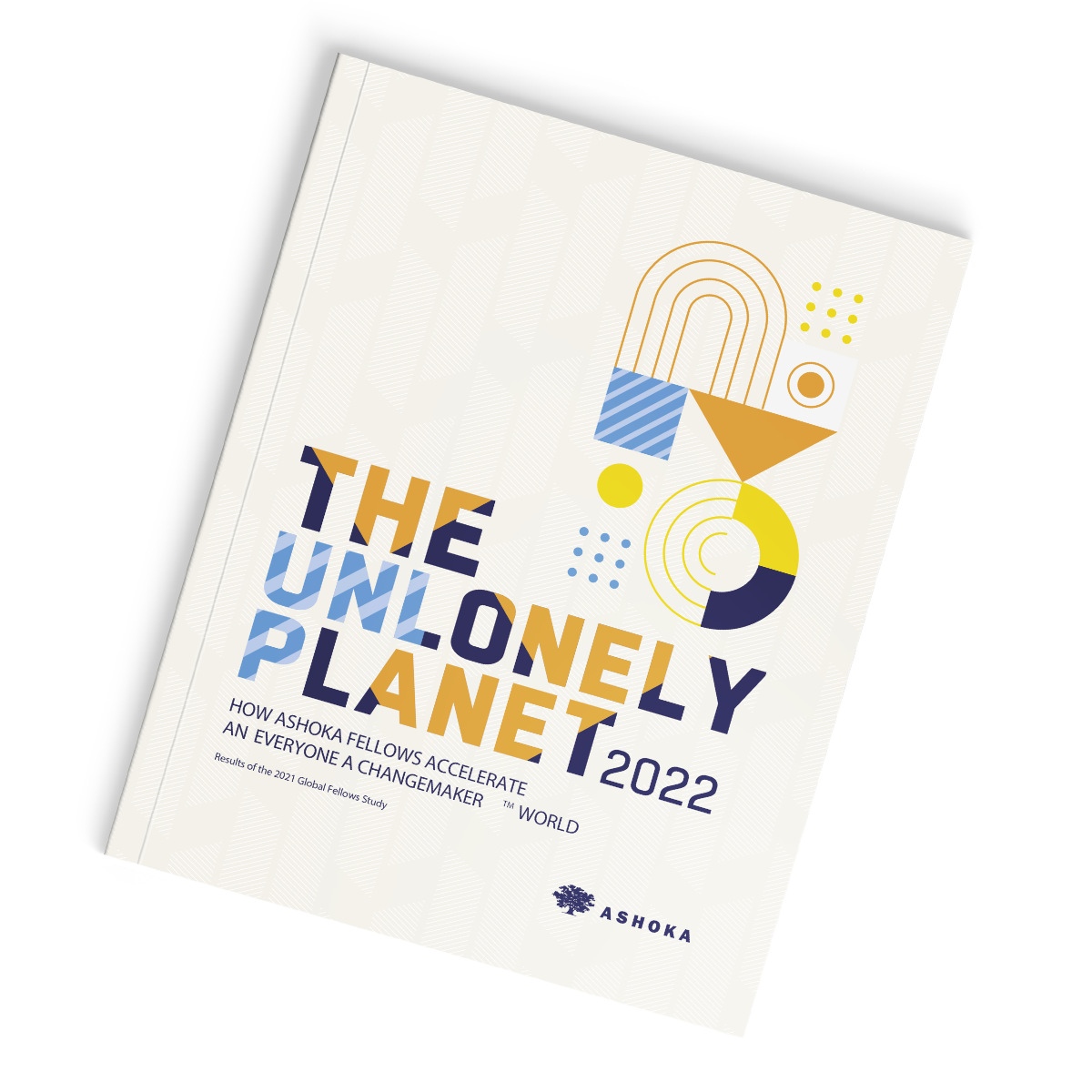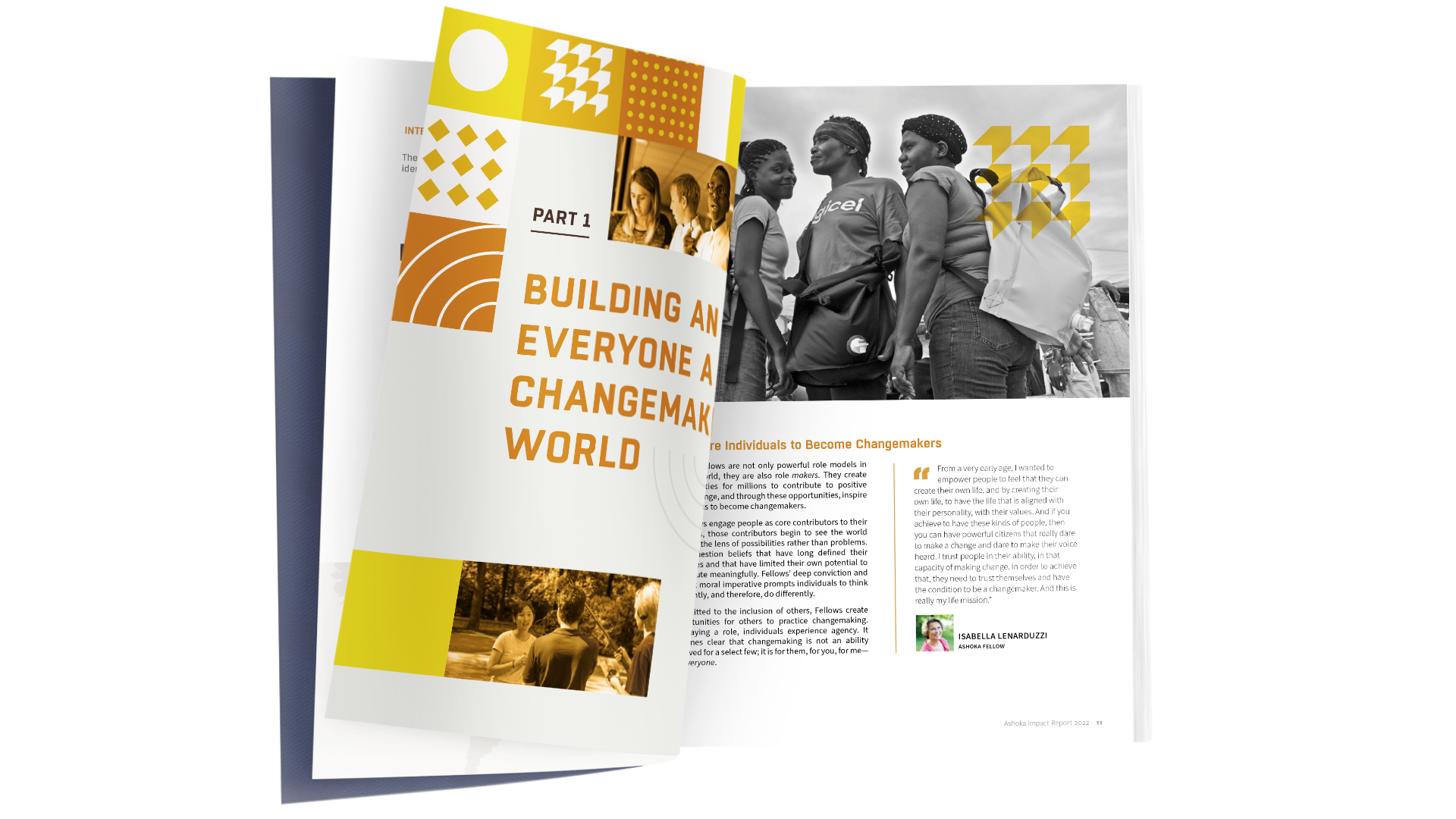des Fellows créent des opportunités d'emploi
The Unlonely Planet 2022
Comment les Fellows Ashoka construisent un monde dans lequel nous sommes tous acteurs de changement
Comment les Fellows Ashoka engagent-ils les individus à devenir des acteurs de changement ? Quelles stratégies utilisent-ils pour établir des partenariats qui inspirent les acteurs du changement et amènent des solutions ? Comment changent-ils les systèmes pour créer un monde où chacun peut contribuer et s'épanouir ?
Ashoka présente son étude mondiale sur les entrepreneurs sociaux et leur impact systémique. Cette étude présente les 11 stratégies utilisées par les Fellows pour construire un monde d'acteurs de changement.

Le rapport
Tous les trois ans, Ashoka conduit une étude pour analyser la manière dont ses Fellows conduisent un changement social durable. En 2021, nous avons quantifié la manière dont les Fellows font évoluer les mentalités, changent les politiques publiques et incitent d'autres personnes à devenir des acteurs du changement.
Au total, 817 Fellows Ashoka ont participé à l'enquête mondiale et 32 ont participé à des entretiens approfondis. La méthodologie, l'analyse et la collecte des données ont été menées conjointement par une équipe de Tyresia, l'école de commerce de l'École polytechnique de Milan et l'équipe « Impact and Evidence » d'Ashoka.
Voici quelques-unes des principales conclusions de l'enquête 2021 sur les Fellows Ashoka, qui représente l'une des plus grandes études sur les entrepreneurs sociaux à l'échelle mondiale.

Les Fellows Ashoka construisent un monde dans lequel nous sommes tous acteurs de changement
Le rapport présente les 11 méthodes utilisées par les Fellows Ashoka pour inciter les individus à s'engager et à apporter des solutions dans leurs communautés :
? Inciter les individus à devenir des acteurs de changement
Stratégie 1 : Créer des opportunités de contribution. Outre la création d'emplois (95 % des Fellows) et d'opportunités de bénévolat (87 %), de nombreux Fellows reconnaissent qu'il est temps d'opérer un changement fondamental, en particulier en ce qui concerne le rôle des jeunes. 89% des Fellows confient à des jeunes la responsabilité de conduire le changement au sein de leur organisation.
Stratégie 2 : Encourager les individus à croire en leur capacité. En encourageant la résolution de problèmes, même à petite échelle, les Fellows développent le sens de l'action chez celles et ceux qu'ils accompagnent. En donnant à une personne la possibilité d'agir et de faire la différence, même à petite échelle, on déclenche un engagement à long terme en faveur du changement.
Stratégie 3 : Redéfinir les « faiblesses » comme des forces. Les différents entretiens ont montré que les Fellows font le point sur les compétences des personnes et les invitent à les utiliser à bon escient. En outre, ils examinent ce que la société dans son ensemble peut percevoir comme des faiblesses et y trouvent des forces, en tirant parti d'expériences ou de compétences diverses pour susciter un changement positif.
Strategy 4: Support changemaker identity development. Ashoka Fellows identity as changemakers sustains their commitment to systems-change work. This identity benefits their communities and professional endeavors as well as their personal development and quality of life. Wanting this for those around them, Ashoka Fellows help others to develop changemaker identities.
? Ashoka Fellows collaborate to engage more changemakers
Strategy 5: Build multiplier partnerships. Ashoka Fellows build partnerships to generate solutions, impact, and changemakers. They work with others toward a shared vision. They often relinquish control and ownership of their ideas to see them spread as far as possible: 82% of Ashoka Fellows have had their innovations replicated by others (through strategic partnerships, open sourcing or licensing, among other methods). 61% replicated within their country, and 42% at an international level.
Strategy 6: Create space for the community’s voice. Ashoka Fellows see community members not as beneficiaries, but as experts and decision-makers. As such, they create space for community members to develop solutions and voice their plans for action. They present ideas and ask for input from a range of stakeholders or invite others to partner in implementing solutions.
Strategy 7: Engage individuals everywhere. Interview data show that Fellows strategically target community members who are beyond the inner circle of allies. By targeting “unlikely allies,” Fellows can often engage those who may not normally encounter a specific social issue, but who can meaningfully contribute to positive social change.
⚡ Ashoka Fellows change systems to support all changemakers
Strategy 8: Shift policies and market systems. Many institutions either by design or inadvertently prevent large portions of society from reaching their full potential. Ashoka Fellows shift systems and restructure institutions to operate in service of the collective good and provide many more people the freedom and support to contribute. They do this by changing policies of large companies or industries (51%), encouraging them to include previously excluded communities (52%), or creating value for a product or service where it didn’t exist before (51%). At the legislative level, 63% of Ashoka Fellows changed or influenced government policy, while 66% have advised policymakers as experts.
Strategy 9: Influence societal mindsets or cultural norms. By influencing societal mindsets and cultural norms, they help others see and act in accordance with social changes that benefit all. Fellows do this by encouraging people to think differently (88%), through campaigns (43%), or through programs (21%).
Strategy 10: Foster supportive environments that enable changemaking. Fellows invest their energy in the creation of communities where individuals feel psychologically and physically safe, cared for and supported. They do this within the walls of the organizations, but also wherever they convene the broader community in public spaces from classrooms to community squares. In doing so, individuals feel comfortable to share their ideas, work with others, and build something new.
Strategy 11: Build ecosystems that sustain changemaking. Interview data show that Fellows bring together funders, businesses, governments, civil society organizations, media companies, and universities to reduce barriers that blunt agency and prevent individuals from engaging in changemaking. By banding together, they can exponentially increase their potential to address issues that perpetuate systemic inequality.